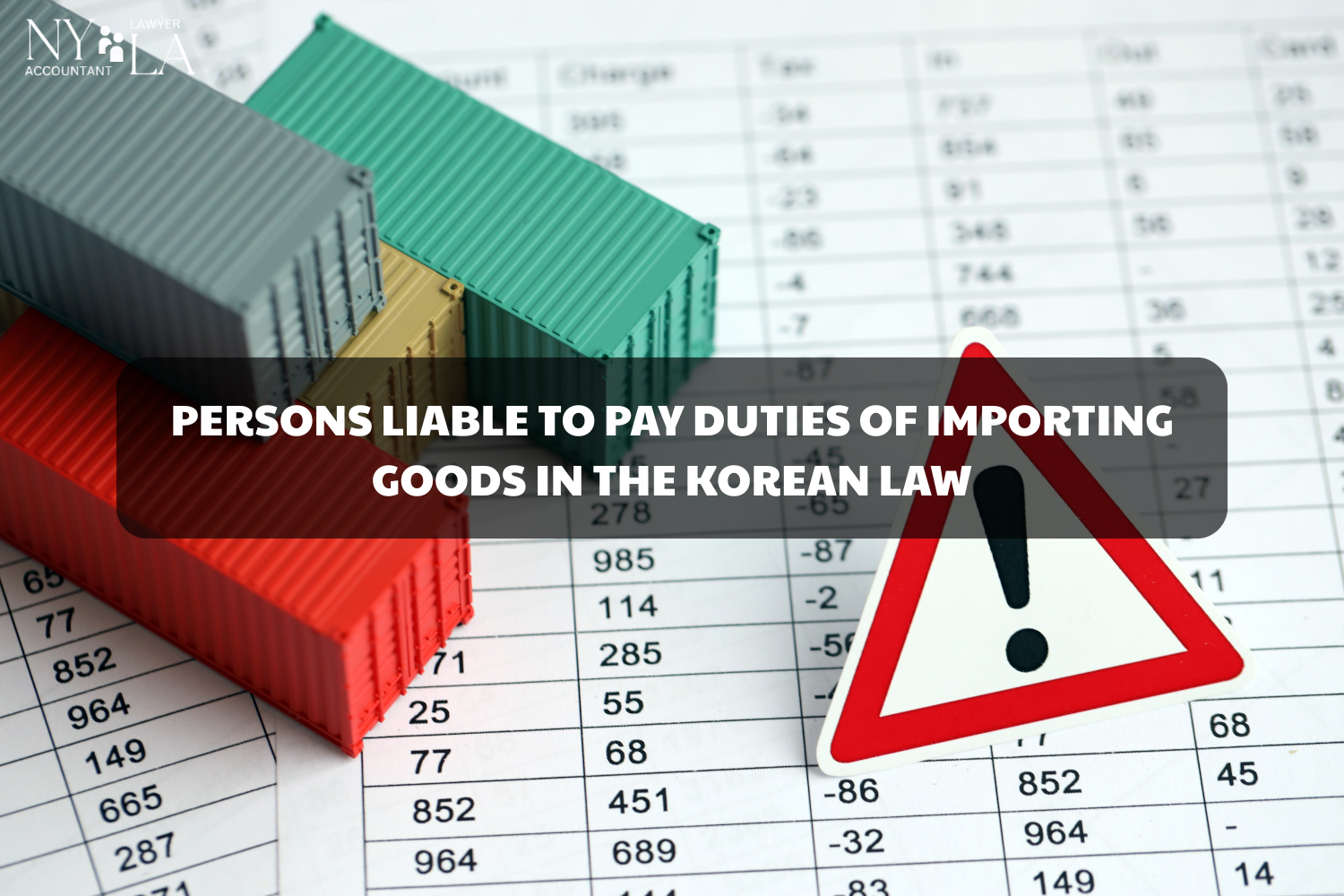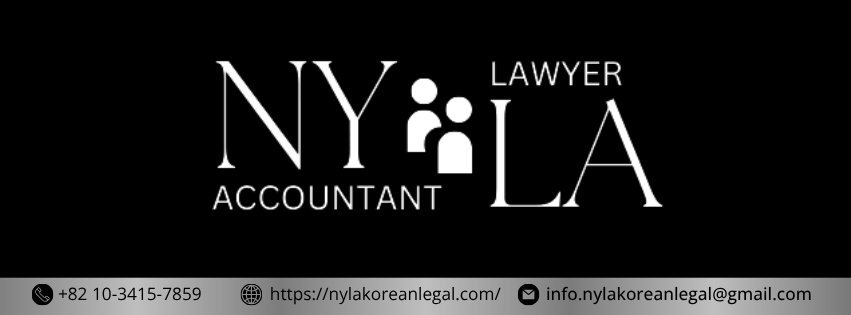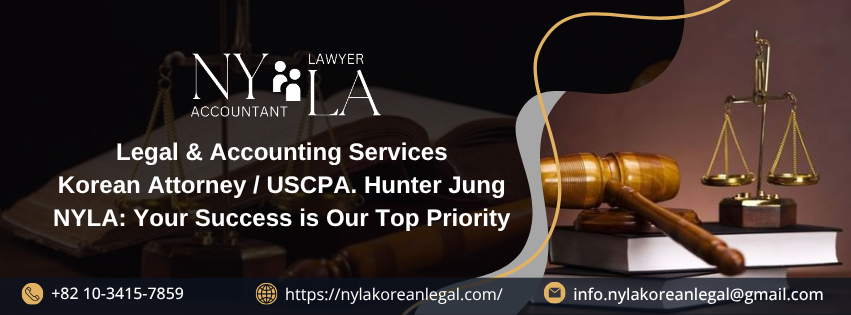Understanding who is responsible for paying import duties under Korean law is crucial for any business engaged in international trade with the Republic of Korea. Governed by the Customs Act, these legal obligations define specific individuals or entities liable for customs duties upon the importation of goods. This article provides a practical and legal overview of import duties under Korean law, focusing on real-world applications and responsibilities.
Summary
1. What Are Import Duties Under Korean Law?
Under Korean law, the term “import” refers to bringing foreign goods into Korean territory or consuming/using them within Korea. However, this definition excludes foreign goods that do not meet the criteria of formal import. Once foreign goods are considered imported, they become subject to import duties under Korean law, which serve both fiscal and regulatory functions.
The Customs Act provides the foundation for determining import duty obligations. It outlines when, how, and by whom customs duties must be paid, based on the type of transaction, the nature of the goods, and the circumstances surrounding their movement or use.
2. Who Is Liable for Import Duties Under Korean Law?
The liability for import duties under Korean law depends on the nature of the transaction and how the goods enter Korea’s territory. Generally, the owner of goods at the time of the import declaration is responsible. However, the law also details several specific cases:
a. When a Declaration Is Filed
In most cases, the person who owns the goods at the time of filing the import declaration bears the duty. This could be:
-
The importer (such as a trading company);
-
A person who entrusted the importation if done under a third-party import arrangement;
-
The consignee listed in shipping documents;
-
A transferee, if goods were transferred before filing.
b. Non-Standard Import Cases
In many practical scenarios, other parties may become liable:
-
Suppliers of vessels and aircrafts: If foreign goods are used as supplies and loaded or unloaded, the person who receives such permission is liable.
-
Repair or supplementary work: If goods are taken out of bonded areas for maintenance, the approved party pays the duties.
-
Storage or damage within bonded areas: If goods are lost, destroyed, or disposed of, the operator or custodian becomes responsible.
Other cases where import duties under Korean law apply include:
-
Bonded transport failures (delayed or non-arrival): The transport-approved party pays.
-
Consumption before declaration: The user or consumer is responsible.
-
Unauthorized workplace storage after permit expiry: The person who filed or received permission must pay.
-
Goods shipped from storage: The shipper takes on the duty.
-
Mail imports: The mail recipient becomes liable.
-
Stolen or missing goods: The responsible party varies depending on location (storage operator, transporter, handler, or custodian).
d. Guarantors
If a third party guarantees the customs duty, that guarantor is also liable — but only up to the guaranteed amount.
By categorizing responsibilities based on real-world logistics activities, the Customs Act ensures that all actors in the supply chain understand their role in complying with import duties under Korean law.

3. Key Takeaways for Foreign Companies and Importers
For foreign investors, multinational traders, or companies entering the Korean market, understanding import duties under Korean law is essential for ensuring compliance and avoiding legal complications. Here are a few practical insights:
-
Plan for duties: Always identify who will bear import duties during contract negotiations.
-
Work with licensed importers: Entrusting your goods to registered customs brokers can reduce the risk of misfiling or misreporting.
-
Ensure bonded area compliance: Mishandling goods in bonded warehouses or during bonded transportation can shift liability unexpectedly.
-
Monitor document flow: Incomplete or incorrectly issued commercial invoices and shipping documents can misidentify the liable party.
4. Why Import Duties Under Korean Law Matter
Non-compliance with Korean customs regulations can result in:
-
Fines and penalties;
-
Delayed shipments;
-
Confiscation of goods;
-
Legal disputes with Korean authorities.
Understanding the scope of import duties under Korean law ensures smooth logistics, proper tax planning, and long-term market success. Even in complex supply chains, each actor must know their customs-related obligations to maintain compliance.
Navigating import duties under Korean law may seem complex due to the variety of possible scenarios and parties involved. However, having a clear grasp of the Customs Act and its application can empower businesses to manage risks effectively. Whether you’re an importer, a bonded area operator, a logistics provider, or a guarantor, it’s vital to understand your role in the customs duty framework.
For companies seeking to expand into Korea, working with legal and customs professionals familiar with Korean import law is strongly recommended. Such expertise helps ensure compliance, reduce risks, and unlock smoother cross-border trade opportunities in one of Asia’s most dynamic economies.
6. About NYLA – Korean Legal Office

■ NYLA – Your Trusted Legal Partner in Korea
At NYLA, we understand that the success of foreign businesses in Korea requires not only a solid business strategy but also reliable legal support. With a team of experienced Korean attorneys and legal professionals, NYLA provides tailored legal services for companies, investors, and individuals operating or planning to establish a presence in Korea.
We support our clients throughout the entire business journey with comprehensive services, including:
- Legal consultation on company establishment, taxation, and immigration;
- Advice on commercial real estate, franchising, and product distribution;
- Support in human resources, marketing, and business strategy.
In addition to legal advisory, NYLA also represents clients in civil litigation cases related to business, labor, marriage, family, and inheritance to ensure their rights and interests are fully protected.
■ Contact NYLA

If you’re a foreign business or individual looking for a reliable legal partner in Korea, NYLA is here to help. We are committed to delivering effective, practical, and personalized legal solutions for every client.
With a proven track record of assisting hundreds of international clients, our team is equipped to help you navigate complex legal challenges—whether it’s commercial disputes, contract issues, or foreign investment guidance.
Don’t let legal matters hold you back. Let NYLA be your trusted guide in the Korean market.
■ Get in touch with NYLA for expert legal support
| Website: https://nylakoreanlegal.com/
FB: https://www.facebook.com/nyla.koreanlegal Tiktok: https://www.tiktok.com/@nylakoreanlegal Youtube: https://www.youtube.com/@NYLA-xd8qx Email: info.NYLAkoreanlegal@gmail.com SĐT: +82 10-3415-7859 |
 |






















































